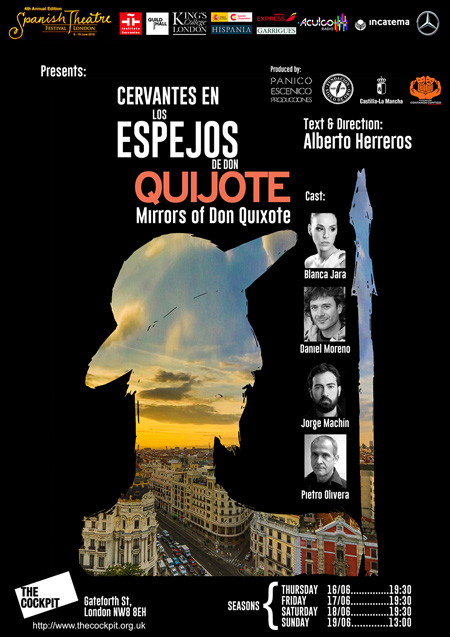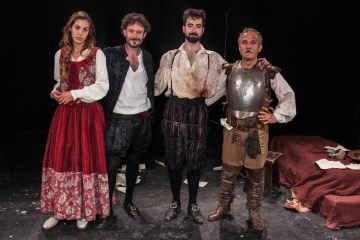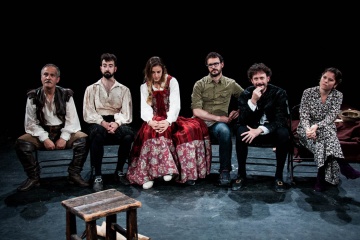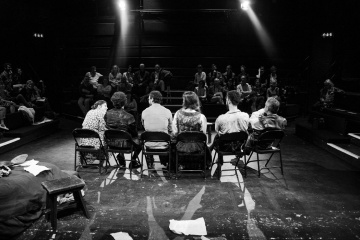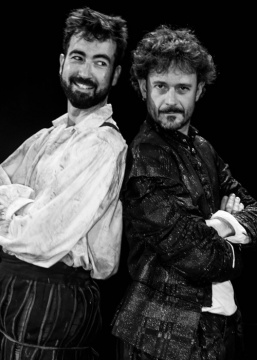Cervantes in the mirrors of Don Quixote
Los Espejos de Don Quijote
Dates: From Thursday 16th June until Sunday 19th June
Time: On Thursday, Friday and Saturday at 19:30. On Sunday at 13:00
There will be a Q&A session (with an interpreter) after Saturday’s performance
Venue: The Cockpit Theatre
Author: Alberto Herreros
Director: Alberto Herreros
Cast: Blanca Jara, Daniel Moreno, Jorge Machín, Pietro Olivera.
Producer: Pánico Escénico
Running Time: 1 hour 10 minutes (approx)
No interval
External link: www.abc.es/cultura/teatros/abci-teatro-espanol-triunfa-mexico-greco-y-legion-tebana-obtiene-premio-acpt-201603181711_noticia.html
External link: www.panicoescenico.es/portfolio/los-espejos-de-don-quijote
External link: aculco.co.uk/los-espejos-de-don-quijote-llegan-a-londres
The play is based on new research into the over-mythologised personality of the protagonist, Cervantes. We tend to think of Cervantes as a literary figure, a bookworm, like Camilo José Cela, a vision implanted by the over-worn portrait of the author wearing a ruff and brandishing a quill. We know a few facts about Cervantes’ life, some odd pieces of the jigsaw, but these have not allowed us to build a complete and realistic picture of him.
The impact of Cervantes, as the author of Don Quixote, on the history of literature and the history of Spain, has clearly resulted in all the attention being focussed on this aspect of his life, so that we have reinterpreted the rest of his biography and work very partially, with a preconceived – and consequently diminished – view of his personality.
Cervantes did not go off to war in the same way as someone plays a game of tennis and then returns home to knuckle down to his writing. Cervantes comes back from the war and five years in an Algerian prison in a very disturbed state of mind. He finds it hard to accept the serious crisis afflicting the country. Spain seems to have shrunk. He asks for a transfer to the Indies. This is a Cervantes who finds Spain too restrictive, who shows signs of psychological trauma. He is clearly hyperactive, a dangerous character in every sense, suffering from battle fatigue. This Cervantes is no Camilo José Cela; he’s more like “Rambo”.
After a few odd jobs in central and southern Spain, Cervantes was locked up again, in the royal prison in Seville. This hyperactive individual, who found Spain too restrictive for him, experienced unspeakable suffering in his prison cell. But then something unexpected happens. Cervantes goes through a period of enforced reflection within those four walls. He discovers himself for the first time. This is where he discovers the “Don Quixote” character, a reflection of himself. This is where Cervantes discovers his internal madman and the reasons determining his life up until then. He is an ordinary soldier who thinks he is a knight, and now he is living this fantasy in La Mancha and Andalusia. He is trapped within this fantasy, which enables him to make sense of the war and survive it psychologically, at least temporarily.
This is where we make our second great discovery. Don Quixote is another over-mythologised character. He has gone down in history as a great defender of justice, because of his marvellous speeches in the novel on freedom and justice, with which the knight errant goes forth to change the world. But the old man does nothing but run through monks, villagers, innkeepers and the like. In other words, Don Quixote is a character who talks about justice but whose behaviour is violent and unjust. The multiple dimensions of the character, Cervantes’ great genius, only serve to reflect the Platonic dichotomy between injustice and rhetoric, and act as a mirror of all times and all individuals. Cervantes saw, in this Don Quixote, the whole tragedy of the disassociation between injustice and the countervailing propaganda of the Spanish Empire on whose behalf he had been fighting. The most important thing is that, in this Don Quixote, Cervantes had the courage to see himself and laugh at himself.
From that moment onwards, Cervantes’ life changed. He stopped being a thug and a delinquent. It’s surprising that, with all these pieces, we have not completed the jigsaw portraying the great change that our most famous author made to his life.
This jigsaw, this story, is about the trajectory of Cervantes – now revealed in the play – and as such it should be considered as a piece of transformational art, as an act of rectification through art and culture.
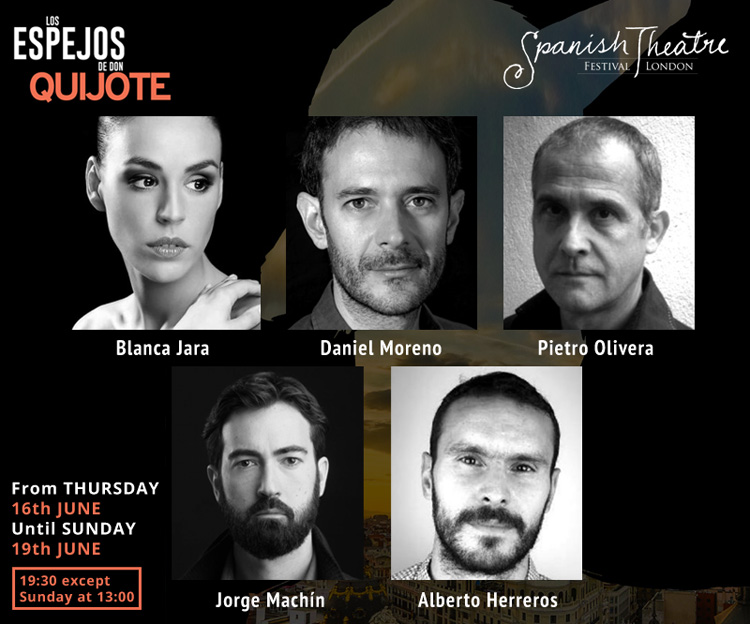
Blanca Jara
Licenciada en comunicación audiovisual y Master en Relaciones Internacionales se forma como actriz con Pablo Messiez, Eduardo Millewicz, Giuseppe Stella y en escuelas como el Jiulliard Acting Studio y Ted Bardy Acting Studio. De gran experiencia en cine con directores como Beda Docampo, Antonio del Real, Víctor García León y Pablo Maqueda. En teatro ha trabajado en Los ochenta son nuestros de Ana Diosadado, El Greco y la legión tebana de Alberto Herreros, La distancia entre tus ojos y los míos y All-Lughta.
Daniel Moreno
Actor de amplia formación con profesionales de la talla de José Luis Gómez, Bruce Myers, Eduardo Vasco, Gennadi Bogdanov, Mar Navarro, Vicente Fuentes, Sol Garre, Hernán Gené, Ana Vallés, Claudio Tolcachir… En televisión ha participdo en La que se avecina, Cuéntame como pasó, Los quien, Aída, Águila Roja, Física o Química… En teatro ha trabajado con los directores más prestigiosos del país: Ignacio García, Hernán Gené, Carlos Aladro, Ernesto Caballero, José Luis Gómez, Andrés Lima, Dan Jemmet, Placo Plaza, Carles Alfaro… En Teatro de la Abadía, Centro Dramático Nacional, Teatro Español, Compañía Nacional de Teatro Clásico…
Jorge Machín
Licenciado en interpretación textual por la RESAD se ha formado además con José Luis Gómez, Ernesto Arias, Marcelo Magni, Carlos Aladro, Mar Navarro, Vicente Fuentes, Hernán Gené, Fernando Piernas, Will Keen, Bruce Myers y Claudio Tolcachir. De una extensísima trayectoria en teatro con los mejores directores como: Ernesto Caballero, Aitana Galán, Carlota Ferrer, Mariano de Paco, Fefa Noia, Juan Antonio Hormigón, en los mejores teatros del país: Teatro de la Abadía, Teatro Español, Compañía Nacional de Teatro Clásico…
Pietro Olivera
Actor de teatro, TV y cine. Profesor, coach, director y ayudante de dirección.
En teatro ha trabajado con Alfredo Sanzol, Mario Gas, Carlos Aladro, Helena Pimenta, Luis Bermejo, Mauricio Scaparro, Roberto Cerdá, Jose Estruch, J.A.Vizcaino, Juan Margallo, Eva del Palacio…
En televisión ha trabajado entre otras en series como Aguila roja, Centro Medico,Seis Hermanas,Gran Reserva(El Origen), La Señora, 700 Euros, Fuera de lugar,La que se avecina,Escenas de matrimonio,Cuentame, Los Serrano,Periodistas…
En Cine ha interpretado entre otras “Gente de mala calidad”, “Dispongo de barcos y “Esa Sensación”, “El milagro de P.Tinto”, “CANDIDA”, “Muertos de Risa”, “Segundo asalto” o “Vivir es fácil con los ojos cerrados”.
Alberto Herreros
Dramaturgo, director y actor teatral. Licenciado en Psicología en 2000 y doctor en Filosofía. Se forma en Dramaturgia bajo el magisterio de Juan Blanco. Trabaja como psicoterapeuta y profesor de actores profesionales. Se forma en interpretación con maestros como Sergio Chazin, Fernanda Orazzi, Victoria di Pace, Else Marie Laukvik y Arnold Taraborrelli. Trabaja como actor en televisión: Policías, Siete vidas y Compañeros, en la película Tiempo de tormenta de Pedro Olea, y en las obras de teatro: ¿Todos somos santos?, La cantante con peluca y El Vértigo Sensible. En 2010 escribe PULSO A LA ITALIANA, y en 2012 su obra TRASÍMACO. Ese mismo año funda la Compañía ELENKHOS y la productora PANICOESCENICO. En 2013 termina LOS ESPEJOS DE DON QUIJOTE (Obra oficial de la comisión Cervantes 2016) y en 2014 EL GRECO Y LA LEGIÓN TEBANA (Premio Dama de la Victoria 2015 a la Mejor Obra Internacional).
